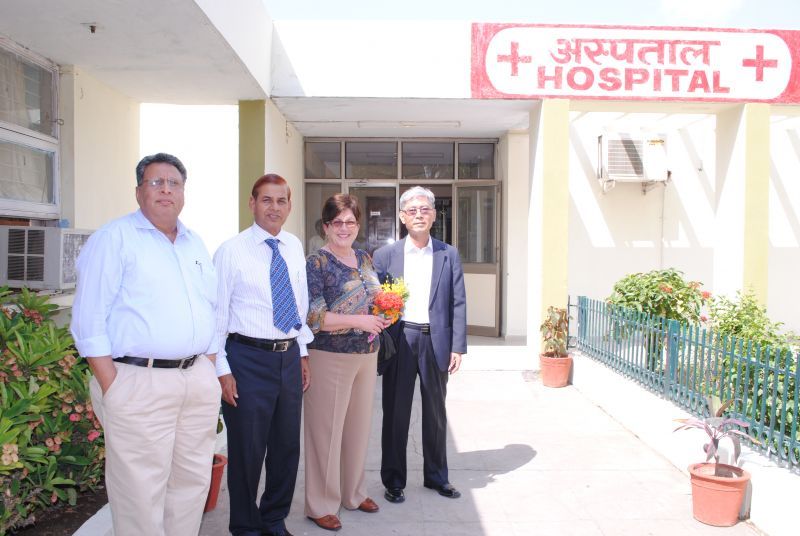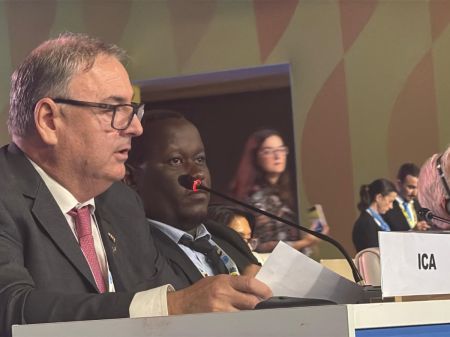
Following a trip to India last month, ICA President Dame Pauline Green writes about the significance of co-operatives in the country and how one of its largest co-operatives builds on the influence of co-operator and social reformer Robert Owen . . .
India is now getting used to being something other than just a ‘developing’ country, as its economy continues to grow at rates significantly greater than those of the mature Western economies — an average of 7.6% between 2002 and 2007, and of 8.2% for the four years 2007 to 2011.
So what of its huge co-operative sector?
The largest co-operative country by numbers of primary co-ops at just over 610,000, with 98% of Indian villages covered by co-operatives that are active in a vast range of economic activities, the Indian movement represents one quarter of the worlds one billion individual co-operative members!
A three-day visit can only touch the surface of understanding just what that means for the future of co-operation in this vast, teeming, energetic and young country as it starts to lift itself into a better future.
The ICA has had an Asia Pacific office in New Delhi now for over 50 years and this was the starting place for my visit. Its key aim was to recognise the growing influence of the Indian political and economic leadership in the global economy, and the role of the leadership of the Indian co-operative movement in helping to develop its representative role, not just its traditional work on behalf of Indian co-operatives, but more particularly now on global issues as well.
The office visit was also a rare and valuable chance to visit with the staff of the New Delhi office, and I was able to see the way in which a significant tranche of the historical archive of the ICA (recently transferred from Geneva) is now housed and being catalogued in the library facility. Ultimately, the catalogue will be made available for worldwide researchers, whilst we continue to find ways to digitize as much as possible.
The Indian Farmers Fertiliser Cooperative (IFFCO) has been a strong supporter of the work of the ICA and the international movement particularly during the last decade. Started in 1967 with 59 co-operative members, IFFCO now has nearly 40,000 primary co-ops grouping 55 million farmer members, and a turnover in 2011-12 of over USD 4.5 billion. The largest fertiliser production business in India by far, it now has five major manufacturing units in India, and significant investment in fertiliser production in Dubai, Oman, Jordan, Senegal and recently Peru and Canada.
Is this just big business? Not a bit of it.
What really encouraged me was the detailed, planned and utter focus of management and staff on trying to take a business with a traditional heavy energy and waste water discharge, and take down those levels year on year, and at the same time encourage the use of non chemical fertiliser amongst its farmer membership through its ‘Save Our Soil’ campaign. Whilst that campaign started relatively recently, at a meeting I attended of a primary co-op in the village of Isanpur Mota in Gujarat, it is clear that the farmers had a very good understanding of the issues, and their need to protect their soil. Whatsmore, they were using their collective initiative to go further and develop a bio-digester and other organic fertiliser alternatives themselves, and by the way, the Chairman of the co-op showed me round the soon to be finished building that will become a shopping unit to bring consumer goods to the village. This is grass roots co-operation at its best and I was inspired.
One of the most powerful moments was to visit the IFFCO township. I was struck by the strong resonance with the work of social reformer Robert Owen’s New Lanark, as I saw the homes built to house the workers at the original manufacturing plant in Kalol, Gujarat, some four kilometres away. Incidentally, those workers of the enlarged workforce not now able to be housed by IFFCO are given a 25% (of salary) housing allowance to find suitable local housing. The township had a shopping mall, a four bed hospital unit with doctors and nurses in attendance each day, a school, multiple play and recreation areas, a post office and bank, a small Hindu temple for worshippers, and a small facility where retired family members of workers could meet to avoid loneliness and alienation. The three gentlemen present when I visited told me that the Managing Director of the site visited them about once a fortnight to chat and see how they were.
So was this a one off, built when the co-operative was new in the 1970s and started as some idealistic dream?
No, the same provisions have been provided at all five manufacturing units — just as every floor of the head office in New Delhi has exercise bicycles somewhere along the corridor! When you travel the streets of India and see the levels of housing deprivation, poverty and need that still waits to be tackled, it is very easy to see how unusual IFFCO is and why people are so loyal and keen to do a very good job.
The last day in New Delhi was a public holiday, but despite that, the long-standing national member of the ICA in India, the National Cooperative Union of India (NCUI) brought together about 70 people including many of its governing council and the leaders of many of its state co-operative federations and business sectors to talk to me and the Secretary for Agriculture and Cooperatives from the Indian Government Mr Dilip Singh.
The NCUI has a major education and training arm and provides key traditional trade association services to this huge movement, and produced the excellent ‘Indian Cooperative Movement A Statistical Profile’ from which some of the statistics in this short article were taken. It was a unique opportunity to spend a couple of hours listening to just what they do and what their concerns are. What was very clear is that they know that they have some great challenges and some huge opportunities in the coming decades. They worry about the relationship with government, about some poor governance, a growing lack of knowledge about the value of co-operatives, the need for more co-op to co-op business, whether they can fund development — all this sounds very familiar? They can take heart that these are the worldwide issues that dominate the co-operative movement and that led us to come together in 2012, the International Year of Co-operatives, and develop the Blueprint for a Co-operative Decade.
Am I confident that the Indian co-operative movement will continue to flourish in the new economic order? Yes, but there are some fundamental concepts that will make it much less painful as the need to embrace change becomes more evident — the most crucial is that they work together. This was also one of the challenges that they raised with me.
The NCUI has just negotiated a ground-breaking change in the Indian co-operative law to enshrine the right to form a co-operative as a fundamental right of Indian citizens. If they are to make the most of this great opportunity, then confronting the competing interests of the sovereignty of an individual co-operative enterprise, with the need to lift their collective eyes to the big picture in a maturing domestic economy in a global market, will become paramount. I have every confidence that they will do so.
— by Dame Pauline Green, President, ICA.




